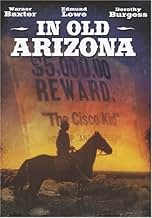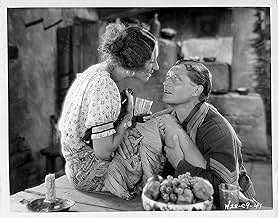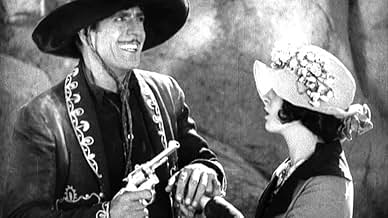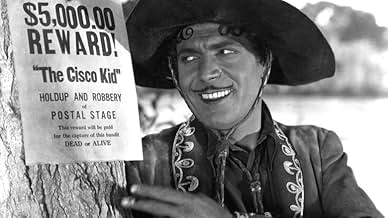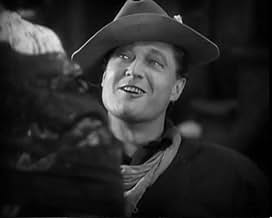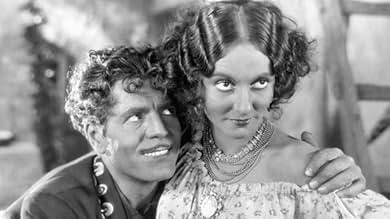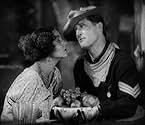VALUTAZIONE IMDb
5,5/10
1442
LA TUA VALUTAZIONE
Aggiungi una trama nella tua linguaA charming, happy-go-lucky bandit in old Arizona plays cat-and-mouse with the sheriff trying to catch him while he romances a local beauty.A charming, happy-go-lucky bandit in old Arizona plays cat-and-mouse with the sheriff trying to catch him while he romances a local beauty.A charming, happy-go-lucky bandit in old Arizona plays cat-and-mouse with the sheriff trying to catch him while he romances a local beauty.
- Regia
- Sceneggiatura
- Star
- Vincitore di 1 Oscar
- 4 vittorie e 4 candidature totali
Henry Armetta
- Barber
- (non citato nei titoli originali)
James Bradbury Jr.
- Soldier
- (non citato nei titoli originali)
Frank Campeau
- Man Chasing Cisco
- (non citato nei titoli originali)
John Webb Dillion
- Second Soldier
- (non citato nei titoli originali)
Alphonse Ethier
- Sheriff
- (non citato nei titoli originali)
Jim Farley
- Townsman
- (non citato nei titoli originali)
William Gillis
- Guard
- (non citato nei titoli originali)
Pat Hartigan
- Cowpuncher
- (non citato nei titoli originali)
Soledad Jiménez
- Tonita the Cook
- (non citato nei titoli originali)
Ivan Linow
- Russian Immigrant
- (non citato nei titoli originali)
Tom London
- Man in Saloon
- (non citato nei titoli originali)
Helen Lynch
- Stagecoach Passenger
- (non citato nei titoli originali)
J. Farrell MacDonald
- Stage Passenger
- (non citato nei titoli originali)
Julius Viggo Madsen
- Tenor in Quartet
- (non citato nei titoli originali)
Recensioni in evidenza
In Old Arizona made for Fox Films in 1928 has the distinction of being the first all sound film and by dint of that the first all sound western. Warner Baxter won the second Academy Award given out for Best Actor and In Old Arizona bringing to the screen that legendary Robin Hood of the West, The Cisco Kid.
This version of Cisco is a whole lot different than the show I remember as a lad. Duncan Renaldo was a gentlemen, a caballero in the full meaning of the word, ever ready to help anyone in distress. He was a Latino version of Hopalong Cassidy and Cisco and Hoppy had a revival of popularity in the early television days.
But both of those characters were far from what Clarence Mulford and William Sydney Porter wrote. Hoppy was a tobacco chewing rather profane cuss who worked on the Bar 20 ranch, not the kid's role model William Boyd made him. Similarly the Cisco Kid was a charming fellow even for a bandit. But he was a most unapologetic man about his profession.
For this film Baxter's Cisco is cleaned up somewhat, still though he exacts a terrible, but quite just vengeance for betrayal, something Duncan Renaldo never would have done.
Today with political correctness, a man like Warner Baxter never would have been cast as the Cisco Kid, let alone win an Oscar for the role. But Baxter went on to do Cisco in four more films before folks like Cesar Romero, Gilbert Roland and Duncan Renaldo took the character over. There's a reason for this, Warner Baxter did a superb job in the part. Though his accent is obviously fake, he in no way demeans Latinos with his portrayal.
Dorothy Burgess is Cisco's best girl, I say best because she's far from the only one. She's a girl with big ambitions though and a bandit's moll even for a guy as handsome and charming as Warner Baxter has its limits.
Cisco's reeking so much havoc in that country on the American side of the Rio Grande that the army has gotten into the act. With war with Spain imminent, Sergeant Edmund Lowe's been given an order, get Cisco dead or alive.
Lowe essentially brings his Sergeant Quirt persona to the part of New York born sergeant Mickey Dunn. He's about an inch too sure of himself and he too thinks he's best with the ladies.
In Old Arizona also got nominations for Best Picture, Best Director and it goes without saying Best Sound. Though it's ancient now, a lot of people thought the sound of those ham and eggs cooking on the stove for Cisco in Burgess's cabin was considered revolutionary in 1928.
I recommend it highly especially for the ending. As another Latino icon was fond of saying, someone had a lot of explaining to do.
This version of Cisco is a whole lot different than the show I remember as a lad. Duncan Renaldo was a gentlemen, a caballero in the full meaning of the word, ever ready to help anyone in distress. He was a Latino version of Hopalong Cassidy and Cisco and Hoppy had a revival of popularity in the early television days.
But both of those characters were far from what Clarence Mulford and William Sydney Porter wrote. Hoppy was a tobacco chewing rather profane cuss who worked on the Bar 20 ranch, not the kid's role model William Boyd made him. Similarly the Cisco Kid was a charming fellow even for a bandit. But he was a most unapologetic man about his profession.
For this film Baxter's Cisco is cleaned up somewhat, still though he exacts a terrible, but quite just vengeance for betrayal, something Duncan Renaldo never would have done.
Today with political correctness, a man like Warner Baxter never would have been cast as the Cisco Kid, let alone win an Oscar for the role. But Baxter went on to do Cisco in four more films before folks like Cesar Romero, Gilbert Roland and Duncan Renaldo took the character over. There's a reason for this, Warner Baxter did a superb job in the part. Though his accent is obviously fake, he in no way demeans Latinos with his portrayal.
Dorothy Burgess is Cisco's best girl, I say best because she's far from the only one. She's a girl with big ambitions though and a bandit's moll even for a guy as handsome and charming as Warner Baxter has its limits.
Cisco's reeking so much havoc in that country on the American side of the Rio Grande that the army has gotten into the act. With war with Spain imminent, Sergeant Edmund Lowe's been given an order, get Cisco dead or alive.
Lowe essentially brings his Sergeant Quirt persona to the part of New York born sergeant Mickey Dunn. He's about an inch too sure of himself and he too thinks he's best with the ladies.
In Old Arizona also got nominations for Best Picture, Best Director and it goes without saying Best Sound. Though it's ancient now, a lot of people thought the sound of those ham and eggs cooking on the stove for Cisco in Burgess's cabin was considered revolutionary in 1928.
I recommend it highly especially for the ending. As another Latino icon was fond of saying, someone had a lot of explaining to do.
I have heard so much about In Old Arizona that I truly was anticipating a genuine 'western' experience since this was a Fox film . I know the production values and story lines in their silents were always entertaining . I kept waiting for a western but it never came .
One has to be able to be able to imagine the newness of sound to comprehend the audience reaction to this film at its release . The frying bacon scene has been recounted in several different publications . The newness of sound was evident throughout the picture with songs , continual dialogue (sometimes very inane ) , sound effects ,etc. The film tried to overload the senses of the viewers with sound that seemed to come in waves to awe the viewers.
The direction receiving an Academy nomination escapes me completely . It appeared the director knew it was sound , but used tried and true 'silent ' techniques . The constant smiling , grinning and bon vivant attitude of Baxter was reminiscent of second tier silent western stars ala Buddy Roosevely , Wally Wales ,Bill Cody , Bob Custer et al. They all used this carefree , devil-may care attitude constantly .
Probably the most noticeable 'throwback ' methods were the exchange between Baxter and Burgess at the end . Both had a double meaning for their phrases which could have translated into a very delightful scene . However both of them resorted to 'silent' facial expressions that let the audience in on the meaning , but not the other character . Cummings showed his lack of knowledge and faith in sound as well as subtlety in expressions , but it understandable given his background and the newness of sound.
Baxter handled himself very well , yet you wonder if the Oscar was for the sound element tied to his performance rather than the strength of his acting alone . He always did a creditable job in any picture . Burgess is another story . Her attempt to portray herself as a Hispanic vamp left a lot to be desired . Still you cannot help but see the definite ' borrowing ' for Pearl Chavez in Duel in the Sun . There is no mistaking the copy that Jones used .
Finally , the O. Henry ending for the film was a little different . You reap what you sow is very prevalent in Edmund Lowe and Burgess . They sowed deceit and reaped their just desserts . However , Baxter just goes on his outlaw ways with no consequences . He admits it will come one day for him, but we don't see it . So there is morality and amorality . Where there is no dialogue , I was fascinated how some outdoor scenes took on a John Ford Monument Valley look .
The scene where Burgess goes into the saloon to meet Lowe is priceless . She walks in and she and a customer start exchanging ' let's do business ' glances . Then she meets Lowe and begins to condemn the women who work there and castigates Lowe for comparing her to them . Her self-righteous air is her best piece of acting in the entire movie.
You knew this was precode with some of the dialogue . When Baxter tells Lowe he is known as " Conejito " , Lowe 's line asking ' is he that fast' is priceless . The allusions abound .
Still this is well worth the time to view . First for the historical as to the use of sound . Then there is the introduction of the Cisco Kid . You have to have this film to trace the evolution of the character in film . When Baxter was talking about Yaqui being his best friend , you almost expected a pan to Pancho based upon preconditioning to the pair .
The morality and the love triangle dominate this film . There is no issue to be resolved as none ever existed . You have a story of 3 people - interesting , but slow moving and slower developing . Glad I own it and watched it
One has to be able to be able to imagine the newness of sound to comprehend the audience reaction to this film at its release . The frying bacon scene has been recounted in several different publications . The newness of sound was evident throughout the picture with songs , continual dialogue (sometimes very inane ) , sound effects ,etc. The film tried to overload the senses of the viewers with sound that seemed to come in waves to awe the viewers.
The direction receiving an Academy nomination escapes me completely . It appeared the director knew it was sound , but used tried and true 'silent ' techniques . The constant smiling , grinning and bon vivant attitude of Baxter was reminiscent of second tier silent western stars ala Buddy Roosevely , Wally Wales ,Bill Cody , Bob Custer et al. They all used this carefree , devil-may care attitude constantly .
Probably the most noticeable 'throwback ' methods were the exchange between Baxter and Burgess at the end . Both had a double meaning for their phrases which could have translated into a very delightful scene . However both of them resorted to 'silent' facial expressions that let the audience in on the meaning , but not the other character . Cummings showed his lack of knowledge and faith in sound as well as subtlety in expressions , but it understandable given his background and the newness of sound.
Baxter handled himself very well , yet you wonder if the Oscar was for the sound element tied to his performance rather than the strength of his acting alone . He always did a creditable job in any picture . Burgess is another story . Her attempt to portray herself as a Hispanic vamp left a lot to be desired . Still you cannot help but see the definite ' borrowing ' for Pearl Chavez in Duel in the Sun . There is no mistaking the copy that Jones used .
Finally , the O. Henry ending for the film was a little different . You reap what you sow is very prevalent in Edmund Lowe and Burgess . They sowed deceit and reaped their just desserts . However , Baxter just goes on his outlaw ways with no consequences . He admits it will come one day for him, but we don't see it . So there is morality and amorality . Where there is no dialogue , I was fascinated how some outdoor scenes took on a John Ford Monument Valley look .
The scene where Burgess goes into the saloon to meet Lowe is priceless . She walks in and she and a customer start exchanging ' let's do business ' glances . Then she meets Lowe and begins to condemn the women who work there and castigates Lowe for comparing her to them . Her self-righteous air is her best piece of acting in the entire movie.
You knew this was precode with some of the dialogue . When Baxter tells Lowe he is known as " Conejito " , Lowe 's line asking ' is he that fast' is priceless . The allusions abound .
Still this is well worth the time to view . First for the historical as to the use of sound . Then there is the introduction of the Cisco Kid . You have to have this film to trace the evolution of the character in film . When Baxter was talking about Yaqui being his best friend , you almost expected a pan to Pancho based upon preconditioning to the pair .
The morality and the love triangle dominate this film . There is no issue to be resolved as none ever existed . You have a story of 3 people - interesting , but slow moving and slower developing . Glad I own it and watched it
This film has been of interest to me for some time now, for a number of reasons. I finally managed to get a copy and saw it yesterday. I now understand why it is not currently generally available-it is dated, of, at best, average quality, not without charm or appeal, to be sure, but the interst here is for a relatively small audience. Not a bad film, by any means, just not terribly engaging. I will say that a knowledge of Spanish greatly enhanced my own enjoyment of this film, as two or three very good lines were delivered in Spanish.
I have now seen three of the five Academy Award Picture nominees in their entirety (and am unlikely to ever see one, The Patriot, as it is reportedly a "lost" film) and part of Alibi. I now understand how Broadway Melody won that year. Of the choices I've seen, it is clearly the best of an average lot. The Patriot may well be better, but I'm unlikely to ever be able to judge that point.
I enjoyed the film, warts and all, but it is rather dated. But, for my money, any movie that gives the leading man the nickname, "El Conejito" (Little Rabbit) can't be too bad. Worth watching. Recommended to old film buffs and film historians.
I have now seen three of the five Academy Award Picture nominees in their entirety (and am unlikely to ever see one, The Patriot, as it is reportedly a "lost" film) and part of Alibi. I now understand how Broadway Melody won that year. Of the choices I've seen, it is clearly the best of an average lot. The Patriot may well be better, but I'm unlikely to ever be able to judge that point.
I enjoyed the film, warts and all, but it is rather dated. But, for my money, any movie that gives the leading man the nickname, "El Conejito" (Little Rabbit) can't be too bad. Worth watching. Recommended to old film buffs and film historians.
It was so enjoyable going way back in time to the Year 1928 and view Warner Baxter,(The Cisco Kid) who played his role the way I would want to see an actor portray The Cisco Kid. Dorothy Burgess, (Tonia Maria) is the girl friend of Cisco Kid and gives a great supporting role as a gold digger who wants plenty of gold, romance and any man who desires her charm. Edmund Lowe, (Sergeant Mickey Dunn) plays a soldier who is hunting down the Cisco Kid and gets himself involved with Tonia Maria in order to set up a trap to catch the Cisco Kid. Sgt.Mickey Dunn is from New York and talks and sings about the Bowery and brags about the cost of a beer for only five (5) cents and all the food you can eat. It is nice to know that Warner Baxter won an Oscar for his performance as the Cisco Kid, who was also the star of many "Crime Doctor" films as Dr. Ordway. This is a great classic film that you will not want to miss from 1928 and also has sound for the voices. Enjoy
How the heck do you rate this movie?
In its day it might have gotten a 9 or 10; but if this were a contemporary movie, perhaps a 2 or 3, with points for cinematography and a decent plot. Compare it to the Marx Brothers' The Cocoanuts - 1929, which is far more entertaining, though the acting is also rather rough, and the plot ... what plot?
The acting is sometimes quite bizarre, with very wide-eyed expressions and rapid gesticulation. It is overacting that is an obvious remnant from the silent days. The dialogue is mostly rough. The Cisco Kid's is good, but the rest sounds stilted. Oddly, the captain is generally not overacting, and seems to be ad libbing his lines, but they still don't seem realistic, though they are interesting. Are his expressions accurate to the 1890s or the 1920s? Either way, it is an interesting fly in the amber.
I can imagine the studio heads, perhaps watching the audience reaction, saying, hey, maybe we need to hire real actors? But the key players went on to successful careers, so the fault seems to lie with the direction.
Accents? Was there, is there an Arizona accent? For some unknown reason, Sergeant Mickey Dunn talks with a fake New Yawk accent (he is the only one that I noticed). In the O. Henry story, there is no mention of being from NYC. And Edmund Lowe was born in San Jose, Calif., so it was presumably Raoul Walsh's decision. Oh, and Lowe taught English and elocution before becoming an actor, so don't blame Lowe. Perhaps it had something to do with NYC having the special sound on film projectors needed to show the film?
What they did with sound was nothing short of astonishing for the time. The opening scene of ringing the bells shows the sound syncing, and also a lack of speed fluctuation - wow and flutter. There is a lot of ambient sound in the movie, but because of modern noise reduction anything too far off is usually inaudible in the remastered sound track. There are points where an actor leans over into a hidden mic, perhaps accidentally. There are only one or two moments where an actor fades to inaudibility.
All this is astonishing for location shooting long before tape recording. Perhaps the coolest part is filming the sound of the old Edison cylinder phonograph, the best they could do for providing a musical sound track at the time. This was the first film with an optical sound track, and it clearly is the reason it became the dominant system until magnetic sound tracks decades later. Watch The Cocoanuts to hear the problems with sound on disk films -- the sound quality varies a lot through the film.
The film is set somewhere between 1897 and 1901, as there is a line mentioning President McKinley, but the setting seems older. This makes it only about 30 years before the date of the film. Does 1983 sound like the olden days to us? Their sense of the passage of time seems different from ours (see the nostalgic Meet Me in St. Louis, for example), but why? Was it a shorter lifespan, or more rapid, dramatic technological progress? Those 30 years saw the invention of airplanes, automobiles, highways, buses and trucks, radio, moving pictures, and now talking pictures. The 19th century must have seemed long ago.
The best part about In Old Arizona is the cinematography. Not only are the scenics beautiful, but the buildings are full of character, as though it was filmed in Daguerrotypes.
I love old movies, perhaps because they were so hard to find. Growing up outside of New York City, there were several independent TV stations that showed old movies, though in the Sixties, that would have meant movies from the Fifties and Forties -- 10 to 20 years old! The best way to see old movies was to watch the Late Show on WCBS channel 2, which as I recall usually started around 11:30 p.m. When that movie was over, they would show an even older movie on the Late Late Show, perhaps around 2:30 a.m., always introduced by Leroy Anderson's The Syncopated Clock.
If the first two movies were short, there might be an even older movie on the Late Late Late Show, perhaps starting around 3:30 or 4 a.m. That is where I would have seen In Old Arizona, on the time slot for people with acute insomnia, a real challenge for a kid to stay up for. But I probably encountered it as a kid, amazed puzzlement that anything so ancient had ever been put on film, as though my TV had been turned into a time machine. (And for those early risers, next was the Sunrise Semester, Sunrise Sermon, or The Modern Farmer, depending on the day.) Now it is my computer that is the time machine.
There are some very old movies that I like to watch now and then, such as International House or Duck Soup. But I doubt I will ever watch In Old Arizona again, except perhaps in 15 years, 2028, when the movie turns 100. It will probably put me to sleep. It almost did this time.
In its day it might have gotten a 9 or 10; but if this were a contemporary movie, perhaps a 2 or 3, with points for cinematography and a decent plot. Compare it to the Marx Brothers' The Cocoanuts - 1929, which is far more entertaining, though the acting is also rather rough, and the plot ... what plot?
The acting is sometimes quite bizarre, with very wide-eyed expressions and rapid gesticulation. It is overacting that is an obvious remnant from the silent days. The dialogue is mostly rough. The Cisco Kid's is good, but the rest sounds stilted. Oddly, the captain is generally not overacting, and seems to be ad libbing his lines, but they still don't seem realistic, though they are interesting. Are his expressions accurate to the 1890s or the 1920s? Either way, it is an interesting fly in the amber.
I can imagine the studio heads, perhaps watching the audience reaction, saying, hey, maybe we need to hire real actors? But the key players went on to successful careers, so the fault seems to lie with the direction.
Accents? Was there, is there an Arizona accent? For some unknown reason, Sergeant Mickey Dunn talks with a fake New Yawk accent (he is the only one that I noticed). In the O. Henry story, there is no mention of being from NYC. And Edmund Lowe was born in San Jose, Calif., so it was presumably Raoul Walsh's decision. Oh, and Lowe taught English and elocution before becoming an actor, so don't blame Lowe. Perhaps it had something to do with NYC having the special sound on film projectors needed to show the film?
What they did with sound was nothing short of astonishing for the time. The opening scene of ringing the bells shows the sound syncing, and also a lack of speed fluctuation - wow and flutter. There is a lot of ambient sound in the movie, but because of modern noise reduction anything too far off is usually inaudible in the remastered sound track. There are points where an actor leans over into a hidden mic, perhaps accidentally. There are only one or two moments where an actor fades to inaudibility.
All this is astonishing for location shooting long before tape recording. Perhaps the coolest part is filming the sound of the old Edison cylinder phonograph, the best they could do for providing a musical sound track at the time. This was the first film with an optical sound track, and it clearly is the reason it became the dominant system until magnetic sound tracks decades later. Watch The Cocoanuts to hear the problems with sound on disk films -- the sound quality varies a lot through the film.
The film is set somewhere between 1897 and 1901, as there is a line mentioning President McKinley, but the setting seems older. This makes it only about 30 years before the date of the film. Does 1983 sound like the olden days to us? Their sense of the passage of time seems different from ours (see the nostalgic Meet Me in St. Louis, for example), but why? Was it a shorter lifespan, or more rapid, dramatic technological progress? Those 30 years saw the invention of airplanes, automobiles, highways, buses and trucks, radio, moving pictures, and now talking pictures. The 19th century must have seemed long ago.
The best part about In Old Arizona is the cinematography. Not only are the scenics beautiful, but the buildings are full of character, as though it was filmed in Daguerrotypes.
I love old movies, perhaps because they were so hard to find. Growing up outside of New York City, there were several independent TV stations that showed old movies, though in the Sixties, that would have meant movies from the Fifties and Forties -- 10 to 20 years old! The best way to see old movies was to watch the Late Show on WCBS channel 2, which as I recall usually started around 11:30 p.m. When that movie was over, they would show an even older movie on the Late Late Show, perhaps around 2:30 a.m., always introduced by Leroy Anderson's The Syncopated Clock.
If the first two movies were short, there might be an even older movie on the Late Late Late Show, perhaps starting around 3:30 or 4 a.m. That is where I would have seen In Old Arizona, on the time slot for people with acute insomnia, a real challenge for a kid to stay up for. But I probably encountered it as a kid, amazed puzzlement that anything so ancient had ever been put on film, as though my TV had been turned into a time machine. (And for those early risers, next was the Sunrise Semester, Sunrise Sermon, or The Modern Farmer, depending on the day.) Now it is my computer that is the time machine.
There are some very old movies that I like to watch now and then, such as International House or Duck Soup. But I doubt I will ever watch In Old Arizona again, except perhaps in 15 years, 2028, when the movie turns 100. It will probably put me to sleep. It almost did this time.
Lo sapevi?
- QuizThe first all-talking, sound-on-film feature shot outdoors.
- BlooperWhen Cisco robs the stagecoach, he is wearing an army holster (flap-over), the same type the Sergeant wears. But for the rest of the movie, he wears an open holster.
- Citazioni
[last lines]
The Cisco Kid: Her flirting days are over. And she's ready to settle down.
- ConnessioniFeatured in The Soundman (1950)
- Colonne sonoreMy Tonia
Words and Music by Buddy G. DeSylva (as DeSylva), Lew Brown (as Brown) and Ray Henderson (as Henderson)
Sung by Warner Baxter (uncredited)
I più visti
Accedi per valutare e creare un elenco di titoli salvati per ottenere consigli personalizzati
- How long is In Old Arizona?Powered by Alexa
Dettagli
- Data di uscita
- Paese di origine
- Lingue
- Celebre anche come
- In Old Arizona
- Luoghi delle riprese
- San Fernando Valley, Los Angeles, California, Stati Uniti(outdoor riding)
- Azienda produttrice
- Vedi altri crediti dell’azienda su IMDbPro
Botteghino
- Lordo Stati Uniti e Canada
- 2.834.000 USD
- Tempo di esecuzione
- 1h 35min(95 min)
- Colore
Contribuisci a questa pagina
Suggerisci una modifica o aggiungi i contenuti mancanti

